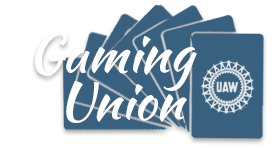Anti-Union Playbook
In a perfect world, management would let workers freely choose whether they want to form a union or not and respect those wishes. But sharing decision-making doesn’t sit well with some bosses, so they take a page from their anti-union playbook and run with it. There’s nothing special or mysterious about this – their plays are designed to take attention off of their behavior and create fear and confusion among workers. The best ammunition is education, so sit back and read a few pages from their manual:
“The union is a third party.” This is a big one and the foundation of a lot of their campaign. If workers think that “the union” is an outside group, then management can convince them that “the union” doesn’t care about their concerns. The truth is that the workers at the worksite are the union and make their own decisions. Being in the Gaming Union doesn’t mean workers vote on the thousands of Gaming Union and UAW contracts across the country – you negotiate, vote on and enforce your own. The company calls unions a third party because it doesn’t want to admit that the power comes from workers standing together.
“Give us another chance.” Even though management might have a long history of disrespect, lack of raises, unfair treatment, inconsistent policies, etc., workers can still bank on them asking for another chance. They may say that the casino didn’t know workers were dissatisfied. They may even start treating workers better and showing new concern. When workers give the company a second chance, they are always bitterly disappointed. Without a binding contract, cosmetic changes implemented today can be taken away tomorrow.
“The casino won’t ever sign a contract, even if one is negotiated.” If the casino is so sure it won’t negotiate, then why bother fighting? The fact is that the casino is required by law to negotiate with workers when they form their union. Nearly every employer talks tough during organizing. But since it is in their best interest to keep the work flowing, a settlement almost always occurs. In fact, Las Vegas is a union town – from chefs to carpenters, workers in the gaming industry know the power of union and their employers are used to negotiating.
“The union just wants your money. You’ll pay outrageous dues.” Even though management never expressed concern about money before, suddenly management is “worried” for workers. Truth is, workers never pay dues until after they negotiate and vote to accept their contract. So before they pay a single penny, they will know exactly what they’re getting.
“When you negotiate a contract, you’ll lose the pay and benefits the casino has so generously given you!” Again – if that were true, then why would casinos fight against workers trying to organize? The truth is that when workers negotiate a first contract, they start with the current pay and benefits and build upon it. It is illegal for management to say workers will bargain from scratch. The strength of our contract will depend on our strength and participation.




